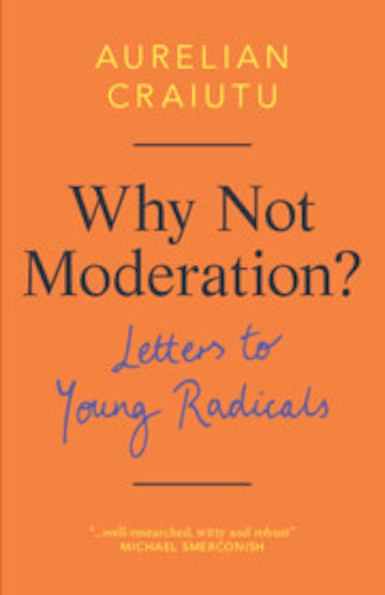College: What was the inspiration for the idea of this epistolary dialogue?
AC: “I thought that it's important to talk to critics about why they don't believe moderation is a solution to our present problems. The dialogical nature of the book is an expression of my desire to reach a general audience, not just for academics.
In fact, I thought that it would be boring or uninspiring to speak to people who share more or less the same views as me or to give pompous lessons from the height of an academic lectern. I see moderation precisely as a form of open dialogue and uninhibited conversation, and thought it would be useful to engage with two students with radical views from each side of the political spectrum. Instead of telling them what to do or what to think, I tried to put myself in their shoes and listen to what they have to say.
I tried to imagine how they see the world through their own perspectives, hopes, and fears, and this opened up the possibility of a dialogue. It’s important to think about objections to your own ideas and principles, and try to respond to them as thoughtfully and reasonably as possible.”
College: In the fraught moment the U.S. is now in, are you hopeful that this book will land successfully with your desired audiences?
AC: “Your question is partly rhetorical; I am not very hopeful that writing a book can solve all our problems. But it contributes to an important social conversation that we must have. First and foremost, what we can do as academics, and as responsible citizens, is to talk about difficult political, cultural, and social issues without anger, and, as much as possible, by relying on facts rather than fake news or imaginary scenarios.
Now, I want to point out that there are moderates on both the left and on the right. My hope is that my message will reach those not just in the middle, but also in the center-left and center-right.”
College: You of course teach. Do you have any insights about rising generations and their ability to dialogue about difficult and contentious topics?
AC: It seems that younger people today are more politically aware than, say, 30 years ago but they may be less informed. I teach political theory and can tell you that political science is very relevant today. Our students realize that it is important to learn what it means to be a citizen in a democratic regime, and that learning about civics and fundamentals of political theory is vital to be able to talk about and tackle effectively difficult problems.
Now, students and young people are flooded with information, and often times, rather than read the news, they tend to get their information from shortcuts like Tik Tok or Instagram. So, one of the tasks we have as professors is to provide students not only with good data, but to show them how to analyze complex and difficult problems, and how to get at factual information and interpret it.”
College: Let’s talk about a unique aspect of your book, the “Ten Rules for a Radical Moderate.”
AC: “The epilogue of the book makes a case for what I call radical moderation. Moderation is not a wishy-washy, fuzzy virtue—the 10 rules express the belief that there is a form of moderation as a fighting creed. Moderation properly understood is a form of realism and pragmatism.
For example, one of the rules insists that we need to always keep open the lines of dialogue with our opponents, our critics, and build bridges across ideological divides. That's easier said than done, and it requires the courage to get out of our own ideological bubbles and speak to people who do not share our views.
At the same time, I want to emphasize that moderation is neither a panacea, nor a recipe for everything. There are moments when you cannot be a moderate, or you can use moderation to conceal your opposition to vital reforms. For example, that’s what happened during the Civil Rights movement when Dr. Martin Luther King, Jr. rightly denounced the moderation of whites who opposed civil rights because, they said, it was not the “right” moment to implement them.
But we should always be prepared to make reasonable compromises. This is always hard, because it is difficult to judge when it's a good thing to make a concession, and when it's not. There are rotten compromises that everyone can recognize, and there are necessary compromises that allow us to live in a free and decent society. My book argues an argument against ‘my way or the highway’ reasoning that pervades so much of our political scene today.”
And, as one of its endorsers (Jonathan Rauch) wittily put it, the book launches a new “MAGA” movement, as it were: Make America Governable Again.”



